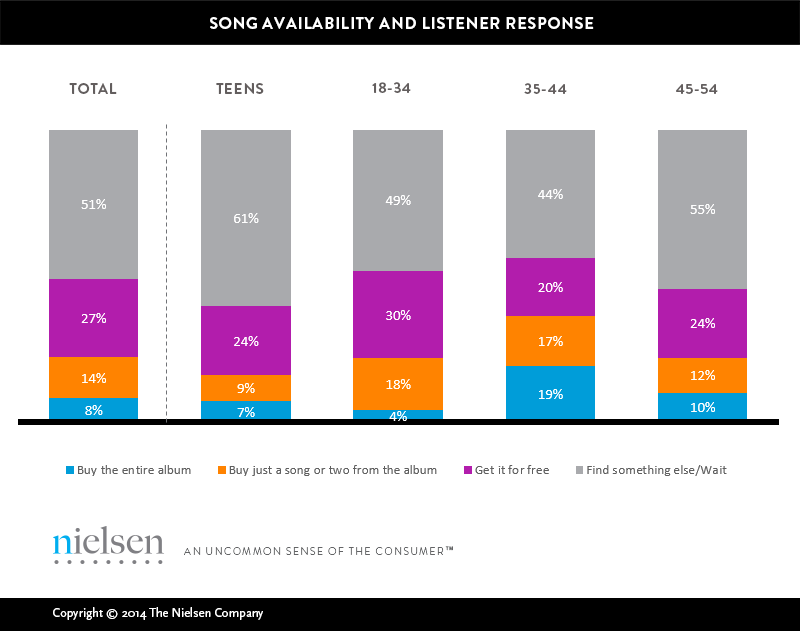Media
Nielsen Weighs in on Taylor Swift-Streaming Music Dispute
Published:
Last Updated:

Nielsen’s answer is, “It depends.” And the two most important variables are the kind of consumer and their spending preferences. Nielsen said:
[T]hose who spend the most money on digital music are, unsurprisingly, the most likely to purchase music unavailable to stream. Similarly, those who pay for streaming services are also more likely to buy the album (14%) than free-streamers (6%), who are far more likely to find a way to get the music for free elsewhere. On the whole, fans willing to purchase music missing from online services are more likely to buy just one or two songs from the album rather than the entire track list.
We wrote a few days ago about Taylor Swift’s decision to pull her new music and essentially all of her back catalog from free streaming services like Spotify because she believes that the music has value and that listeners should pay for it, not expect it for free.
Nielsen included a chart (see below) by age group showing how consumers react to being unable to find the music they want from a streaming service. More than half will either find something else to listen to or wait until the music is available from a streaming service. For Taylor Swift this means that she has chosen both not to be heard and not to get paid by 51% of consumers. That percentage rises to 61% of consumers less than 18 years of age.
In addition to those who are willing to wait, 27% of all consumers will find another way to get what they want for free. This is very likely going to be through YouTube or theft, although Nielsen does not offer any comment on how or where these listeners get the music for free.
Add these two together and more than 75% of all her fans aren’t paying Taylor Swift anything. Does the 8% who will buy the entire album make up for the 75% who don’t pay? Even adding in the fans who will buy one or two songs from a new album from iTunes or some similar service, less than 25% of listeners are paying for anything. And to make up the difference, Taylor Swift and her record label have to sell the CDs at an inflated price.
The fact that Swift sold more than a million albums in a week is a big deal in the second decade of the 21st century — back in the day it was essentially a given for top name acts. Like Adele a few years ago, Swift is the recording business this year, at least as far as CD sales are concerned. Without her it would be in worse shape than it already is. So, it’s Taylor Swift’s music and they’re her fans and she can bring the two together however she chooses.
But it seems reasonable to think that once the buyers figure out that they’re paying too much, they will stop buying altogether. And if they can’t get Swift’s music, they’ll find someone else to listen to or they’ll figure out how to steal Swift’s music.
ALSO READ: Subscription Video Rentals Now Top Rentals

Credit card companies are pulling out all the stops, with the issuers are offering insane travel rewards and perks.
We’re talking huge sign-up bonuses, points on every purchase, and benefits like lounge access, travel credits, and free hotel nights. For travelers, these rewards can add up to thousands of dollars in flights, upgrades, and luxury experiences every year.
It’s like getting paid to travel — and it’s available to qualified borrowers who know where to look.
We’ve rounded up some of the best travel credit cards on the market. Click here to see the list. Don’t miss these offers — they won’t be this good forever.
Thank you for reading! Have some feedback for us?
Contact the 24/7 Wall St. editorial team.